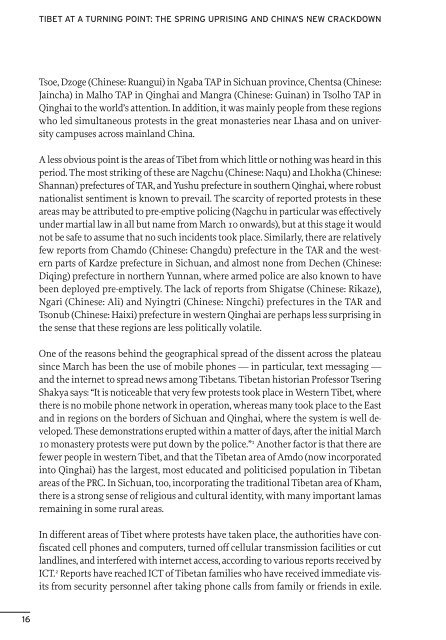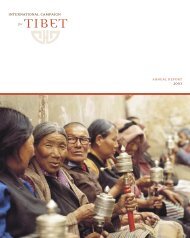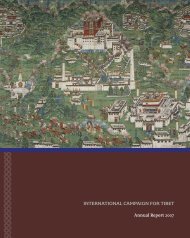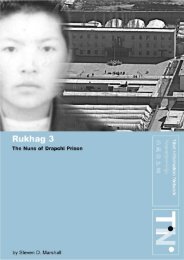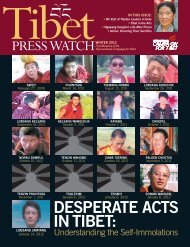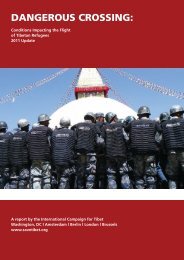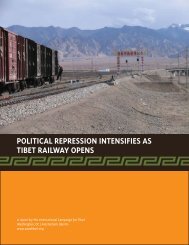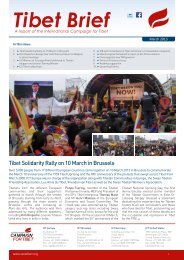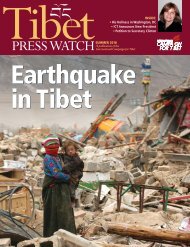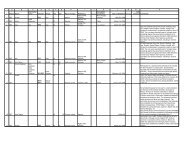download the report - International Campaign for Tibet
download the report - International Campaign for Tibet
download the report - International Campaign for Tibet
You also want an ePaper? Increase the reach of your titles
YUMPU automatically turns print PDFs into web optimized ePapers that Google loves.
TIBET AT A TURNING POINT: THE SPRING UPRISING AND CHINA’S NEW CRACKDOWN<br />
Tsoe, Dzoge (Chinese: Ruangui) in Ngaba TAP in Sichuan province, Chentsa (Chinese:<br />
Jaincha) in Malho TAP in Qinghai and Mangra (Chinese: Guinan) in Tsolho TAP in<br />
Qinghai to <strong>the</strong> world’s attention. In addition, it was mainly people from <strong>the</strong>se regions<br />
who led simultaneous protests in <strong>the</strong> great monasteries near Lhasa and on university<br />
campuses across mainland China.<br />
A less obvious point is <strong>the</strong> areas of <strong>Tibet</strong> from which little or nothing was heard in this<br />
period. The most striking of <strong>the</strong>se are Nagchu (Chinese: Naqu) and Lhokha (Chinese:<br />
Shannan) prefectures of TAR, and Yushu prefecture in sou<strong>the</strong>rn Qinghai, where robust<br />
nationalist sentiment is known to prevail. The scarcity of <strong>report</strong>ed protests in <strong>the</strong>se<br />
areas may be attributed to pre-emptive policing (Nagchu in particular was effectively<br />
under martial law in all but name from March 10 onwards), but at this stage it would<br />
not be safe to assume that no such incidents took place. Similarly, <strong>the</strong>re are relatively<br />
few <strong>report</strong>s from Chamdo (Chinese: Changdu) prefecture in <strong>the</strong> TAR and <strong>the</strong> western<br />
parts of Kardze prefecture in Sichuan, and almost none from Dechen (Chinese:<br />
Diqing) prefecture in nor<strong>the</strong>rn Yunnan, where armed police are also known to have<br />
been deployed pre-emptively. The lack of <strong>report</strong>s from Shigatse (Chinese: Rikaze),<br />
Ngari (Chinese: Ali) and Nyingtri (Chinese: Ningchi) prefectures in <strong>the</strong> TAR and<br />
Tsonub (Chinese: Haixi) prefecture in western Qinghai are perhaps less surprising in<br />
<strong>the</strong> sense that <strong>the</strong>se regions are less politically volatile.<br />
One of <strong>the</strong> reasons behind <strong>the</strong> geographical spread of <strong>the</strong> dissent across <strong>the</strong> plateau<br />
since March has been <strong>the</strong> use of mobile phones — in particular, text messaging —<br />
and <strong>the</strong> internet to spread news among <strong>Tibet</strong>ans. <strong>Tibet</strong>an historian Professor Tsering<br />
Shakya says: “It is noticeable that very few protests took place in Western <strong>Tibet</strong>, where<br />
<strong>the</strong>re is no mobile phone network in operation, whereas many took place to <strong>the</strong> East<br />
and in regions on <strong>the</strong> borders of Sichuan and Qinghai, where <strong>the</strong> system is well developed.<br />
These demonstrations erupted within a matter of days, after <strong>the</strong> initial March<br />
10 monastery protests were put down by <strong>the</strong> police.” 1 Ano<strong>the</strong>r factor is that <strong>the</strong>re are<br />
fewer people in western <strong>Tibet</strong>, and that <strong>the</strong> <strong>Tibet</strong>an area of Amdo (now incorporated<br />
into Qinghai) has <strong>the</strong> largest, most educated and politicised population in <strong>Tibet</strong>an<br />
areas of <strong>the</strong> PRC. In Sichuan, too, incorporating <strong>the</strong> traditional <strong>Tibet</strong>an area of Kham,<br />
<strong>the</strong>re is a strong sense of religious and cultural identity, with many important lamas<br />
remaining in some rural areas.<br />
In different areas of <strong>Tibet</strong> where protests have taken place, <strong>the</strong> authorities have confiscated<br />
cell phones and computers, turned off cellular transmission facilities or cut<br />
landlines, and interfered with internet access, according to various <strong>report</strong>s received by<br />
ICT. 2 Reports have reached ICT of <strong>Tibet</strong>an families who have received immediate visits<br />
from security personnel after taking phone calls from family or friends in exile.<br />
16


